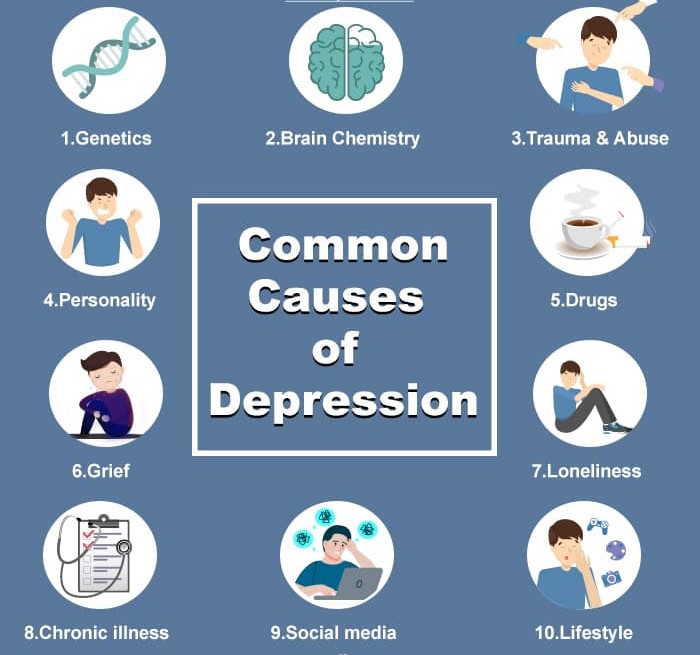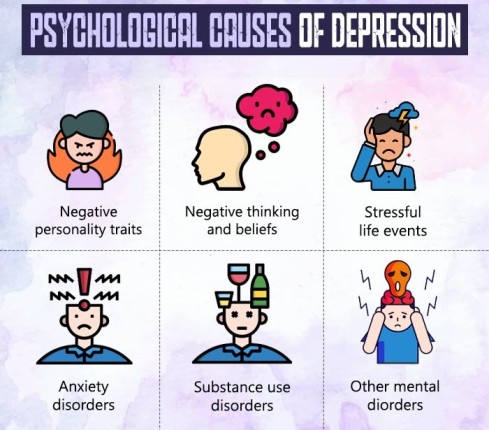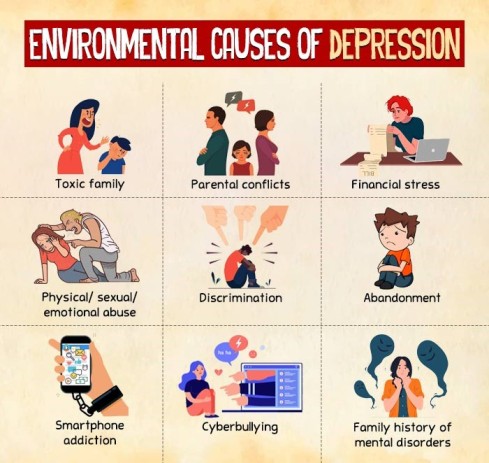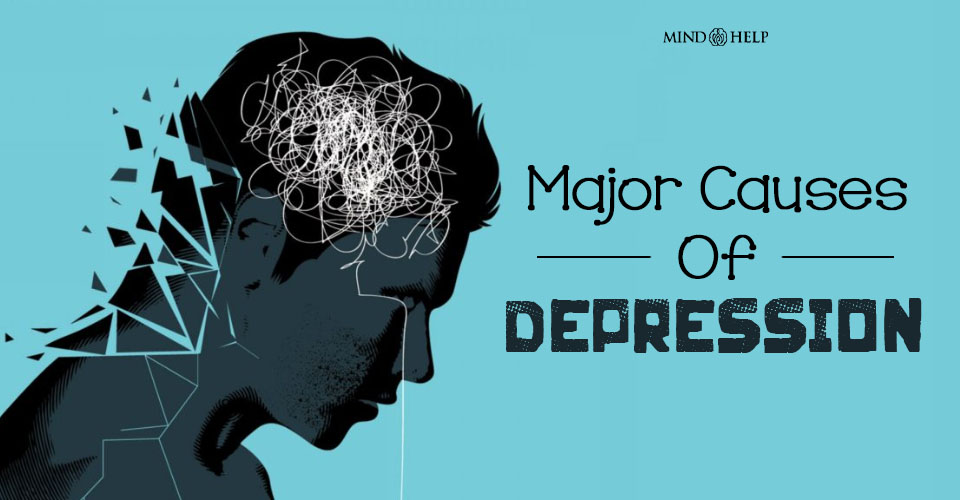Table of Contents
Depression is a serious mental health condition characterized by persistent feelings of sadness, hopelessness, and a loss of interest in daily activities. In severe cases, it can even lead to suicidal thoughts or actions. Its causes are complex and often result from an interplay of multiple factors.
Below are some of the most well-documented and research-backed risk factors that can contribute to the development of depression:

I. Medical causes of Depression
1. Can genetics cause depression?
Research 1 Monroe, S. M., Slavich, G. M., & Gotlib, I. H. (2014). Life stress and family history for depression: the moderating role of past depressive episodes. Journal of psychiatric research, 49, 90–95. https://doi.org/10.1016/j.jpsychires.2013.11.005 shows that depression tends to run in families. If a first-degree or close relative, like a parent or a sibling, has experienced depressive disorders in the past, then it is highly likely that you may also develop depression. In fact, studies 2 Lohoff F. W. (2010). Overview of the genetics of major depressive disorder. Current psychiatry reports, 12(6), 539–546. https://doi.org/10.1007/s11920-010-0150-6 suggest that the heritability for major depressive disorder (MDD), is about 40-50%.
Read More About Major Depressive Disorder (MDD) Here
2. Brain chemistry and depression
People suffering from depression tend to have certain differences in their brain structure 3 Bremner J. D. (2002). Structural changes in the brain in depression and relationship to symptom recurrence. CNS spectrums, 7(2), 129–139. https://doi.org/10.1017/s1092852900017442 and chemistry 4 Yang, X., Ma, X., Li, M., Liu, Y., Zhang, J., Huang, B., Zhao, L., Deng, W., Li, T., & Ma, X. (2015). Anatomical and functional brain abnormalities in unmedicated major depressive disorder. Neuropsychiatric disease and treatment, 11, 2415–2423. https://doi.org/10.2147/NDT.S93055 . Most of the time, these brain changes are caused at birth or by stress and negative developmental experiences. The brain changes are usually associated with:
- Reduced hippocampal volumes.
- Diminished activity of serotonin pathways
- Suppressed neuronal proliferation
- Increased amygdala volume
- Decreased volume of the frontal cortex
- Inflammatory pathways and neural circuits in our brain, etc.
3. Hormonal dysfunction
Changes in hormones such as thyroid, testosterone, estrogen etc. (Studies 5 Altemus M. (2010). Hormone-specific psychiatric disorders: do they exist?. Archives of women’s mental health, 13(1), 25–26. https://doi.org/10.1007/s00737-009-0123-0 ) are also associated with depression. These induce typical depressive symptoms like:
- Fatigue
- Lack of motivation and focus
- Anxiety
- Brain fog
- Irritability
- Sleep disturbances, etc.
4. Chronic illness
Individuals are more likely to develop depression if they are struggling with chronic, long-term, and fatal medical diseases 6 Nabeshima, T., & Kim, H. C. (2013). Involvement of genetic and environmental factors in the onset of depression. Experimental neurobiology, 22(4), 235–243. https://doi.org/10.5607/en.2013.22.4.235 , such as:
- Cancer
- Cardiovascular diseases (like stroke or heart attack)
- Diabetes
- Arthritis
- Kidney diseases
- HIV/AIDS
- Lupus
- Multiple sclerosis, amongst others.
Moreover, the medications 7 Patten, S. B., & Love, E. J. (1997). Drug-induced depression. Psychotherapy and psychosomatics, 66(2), 63–73. https://doi.org/10.1159/000289110 used to treat these complex health disorders frequently induce symptoms related to depression.
II. Psychological causes of Depression
Certain psychological factors can increase a person’s vulnerability to depression. These may include:

1. Personality
Research 8 Robison, E. J., Shankman, S. A., & McFarland, B. R. (2009). Independent associations between personality traits and clinical characteristics of depression. The Journal of nervous and mental disease, 197(7), 476–483. https://doi.org/10.1097/NMD.0b013e3181aad5fc confirms that certain personality traits enhance the vulnerability to depressive disorders, such as:
- Melancholia
- Obsessive-compulsiveness
- Neuroticism
- Narcissism
- Negative emotionality
- Uncooperativeness
- Self-directedness and persistence.
Read More About Narcissism Here
2. Cognitive distortions
A person’s mindset 9 Lang, T. J., Blackwell, S. E., Harmer, C. J., Davison, P., & Holmes, E. A. (2012). Cognitive Bias Modification Using Mental Imagery for Depression: Developing a Novel Computerized Intervention to Change Negative Thinking Styles. European journal of personality, 26(2), 145–157. https://doi.org/10.1002/per.855 , thought patterns, and temperament can also lead to the development of depressive symptoms over time. The risk of depression is higher in individuals who are:
- Pessimistic
- Fatalistic in their life approaches
- Prone to negative thinking
- Inclined to ruminative and repetitive thinking tendencies
- Unable to let go of mistakes or difficult experiences
- More likely to jump to negative conclusions
- Prone to cognitive, attention, and memory biases
- Prone to poor decision-making, etc.
3. Stress
The association between stress and depression is bidirectional and, if untreated, both negatively impact a person’s psychological well-being. Research 10 Starkey, A. J., Keane, C. R., Terry, M. A., Marx, J. H., & Ricci, E. M. (2013). Financial distress and depressive symptoms among African American women: identifying financial priorities and needs and why it matters for mental health. Journal of urban health : bulletin of the New York Academy of Medicine, 90(1), 83–100. https://doi.org/10.1007/s11524-012-9755-x shows that stressful events in our daily lives can increase our susceptibility to depression by changing our brain structure and function, and making us vulnerable to crippling psychological comorbidities.
Read More About Stress Here
4. Psychological disorders
Depression can also develop from other mental disorders, including:
- Substance use disorders (SUD)
- Anxiety disorders
- Eating disorders
- Sleep disorders
- Mood disorders
- Psychosis
- Gender dysphoria, etc.
Read More About Mood Disorders Here
III. Social causes of Depression
The role of one’s social environment in the onset of depression cannot be ignored. Research 11 Achterbergh, L., Pitman, A., Birken, M., Pearce, E., Sno, H., & Johnson, S. (2020). The experience of loneliness among young people with depression: a qualitative meta-synthesis of the literature. BMC psychiatry, 20(1), 415. https://doi.org/10.1186/s12888-020-02818-3 attributes the social causes of depression to:
1. Poverty
Poverty and the stress associated with financial problems can be crucial factors in the development of depressive disorders (Research 12 Sturgeon, J. A., Arewasikporn, A., Okun, M. A., Davis, M. C., Ong, A. D., & Zautra, A. J. (2016). The Psychosocial Context of Financial Stress: Implications for Inflammation and Psychological Health. Psychosomatic medicine, 78(2), 134–143. https://doi.org/10.1097/PSY.0000000000000276 ). In fact, depressive symptoms, such as guilt, suicidal ideation, etc. can arise due to:
- Financial difficulties
- Poor living conditions
- Unemployment, etc.
2. Discrimination
Recent studies 13 Molina, K. M., & James, D. (2016). Discrimination, internalized racism, and depression: A comparative study of African American and Afro-Caribbean adults in the US. Group processes & intergroup relations : GPIR, 19(4), 439–461. https://doi.org/10.1177/1368430216641304 have also attributed the development of depression to discriminatory practices like:
- Racism
- Bullying
- Ethnic segregation
- Xenophobic laws
A recent study 14 Michaels, E. K., Board, C., Mujahid, M. S., Riddell, C. A., Chae, D. H., Johnson, R. C., & Allen, A. M. (2022). Area-level racial prejudice and health: A systematic review. Health psychology : official journal of the Division of Health Psychology, American Psychological Association, 41(3), 211–224. https://doi.org/10.1037/hea0001141 highlighted how racial prejudice worsens health outcomes in black communities, especially black women. Moreover, for years, experts 15 Hill, R. M., Mellick, W., Temple, J. R., & Sharp, C. (2017). The role of bullying in depressive symptoms from adolescence to emerging adulthood: A growth mixture model. Journal of affective disorders, 207, 1–8. https://doi.org/10.1016/j.jad.2016.09.007 have attributed the common causes of depression and suicide in teenagers to school bullying and peer pressure.
Read More About Bullying Here
IV. Spiritual causes of Depression
The main causes of depression related to spirituality and religion 16 Bonelli, R., Dew, R. E., Koenig, H. G., Rosmarin, D. H., & Vasegh, S. (2012). Religious and spiritual factors in depression: review and integration of the research. Depression research and treatment, 2012, 962860. https://doi.org/10.1155/2012/962860 include:
- Atheism
- Religious doubt
- Isolation from one’s own religious community
- Excessive superstition
- Fixation on religious concepts like ‘sins’, ‘virtues’, ‘forgiveness’, etc.
- Excessive self- and spiritual-reflection, etc.
V. Personal causes of Depression
Depression can also be triggered by certain life events or personal circumstances. Some of the key factors are outlined below:
1. Lifestyle
An unhealthy lifestyle is strongly related to anxiety and depressive disorders (Research 17 Bonnet, F., Irving, K., Terra, J. L., Nony, P., Berthezène, F., & Moulin, P. (2005). Anxiety and depression are associated with unhealthy lifestyle in patients at risk of cardiovascular disease. Atherosclerosis, 178(2), 339–344. https://doi.org/10.1016/j.atherosclerosis.2004.08.035 ). These lifestyle habits may include:
- Poor diet
- Lack of exercise
- Excessive smoking and consumption of substances
- Disturbed sleeping patterns
- Sedentary lifestyles
- Prolonged unemployment
- Long-term work stress
- Lack of hobbies and recreational activities
- Other unhealthy habits like gambling, etc.
2. Interpersonal issues
Studies 18 Ahmadabadi, Z., Najman, J. M., Williams, G. M., Clavarino, A. M., d’Abbs, P., & Tran, N. (2020). Intimate partner violence and subsequent depression and anxiety disorders. Social psychiatry and psychiatric epidemiology, 55(5), 611–620. https://doi.org/10.1007/s00127-019-01828-1 confirm that dysfunction in interpersonal relationships is one of the main causes of depression in the youth. Depressive symptoms can be triggered by:
- Intimate partner violence
- Domestic abuse and violence
- Parental conflict
- Infidelity
- Separation and divorce
- Chronic relationship issues
- Codependency or unhealthy attachment patterns
Read More About Codependency Here
3. Death and bereavement
The grief from the loss of a loved one can trigger depressive symptoms and compel a person to develop unhealthy coping habits like disordered eating, excessive sleeping, etc.
Many people develop a syndrome known as “complicated grief” 19 Zisook, S., & Shear, K. (2009). Grief and bereavement: what psychiatrists need to know. World psychiatry : official journal of the World Psychiatric Association (WPA), 8(2), 67–74. https://doi.org/10.1002/j.2051-5545.2009.tb00217.x , also known as prolonged grief disorder, that has the trademark symptoms of depressive disorders.
Read More About Grief Here
4. Loneliness
Recent studies 20 Dyal, S. R., & Valente, T. W. (2015). A Systematic Review of Loneliness and Smoking: Small Effects, Big Implications. Substance use & misuse, 50(13), 1697–1716. https://doi.org/10.3109/10826084.2015.1027933 have shown that loneliness is as dangerous to health as smoking. Loneliness is usually characterized by a lack of close friends or intimate partners. Loneliness and social isolation are some of the leading causes of depression in the elderly population, triggering instances of suicide.
Read More About Loneliness Here
5. Life changes
Certain life changes 21 Bennik, E. C., Ormel, J., & Oldehinkel, A. J. (2013). Life changes and depressive symptoms: the effects of valence and amount of change. BMC psychology, 1(1), 14. https://doi.org/10.1186/2050-7283-1-14 are frequently linked to depression, including:
- Pregnancy
- Career changes
- Relocation, etc.
VI. Environmental causes of Depression
Various environmental factors can also play a role in causing depression, including:

1. Family
A person’s family environment is one of the chief causes of depression. It involves factors related to control, conflict, or cohesion 22 Yu, Y., Yang, X., Yang, Y., Chen, L., Qiu, X., Qiao, Z., Zhou, J., Pan, H., Ban, B., Zhu, X., He, J., Ding, Y., & Bai, B. (2015). The Role of Family Environment in Depressive Symptoms among University Students: A Large Sample Survey in China. PloS one, 10(12), e0143612. https://doi.org/10.1371/journal.pone.0143612 , or a history of abuse and early life stress (ELS). Some of these factors include:
- Dysfunctional family dynamics
- Pathological parenting
- Parental conflict
- Financial constraints
- Physical/ sexual/ emotional abuse
- Abandonment
- Discrimination
- Displacement, etc.
In fact, research 23 Liu R. T. (2017). Childhood Adversities and Depression in Adulthood: Current Findings and Future Directions. Clinical psychology : a publication of the Division of Clinical Psychology of the American Psychological Association, 24(2), 140–153. https://doi.org/10.1111/cpsp.12190 confirms that adverse childhood experiences (ACE) are highly associated with untreated trauma, the development of chronic depressive symptoms, and suicidal ideation.
2. Family history of mental disorders
One of the main causes of depression in women and men is a family history of mental disorders 24 Colvin, A., Richardson, G. A., Cyranowski, J. M., Youk, A., & Bromberger, J. T. (2014). Does family history of depression predict major depression in midlife women? Study of Women’s Health Across the Nation Mental Health Study (SWAN MHS). Archives of women’s mental health, 17(4), 269–278. https://doi.org/10.1007/s00737-014-0433-8 , including:
- Depressive disorders
- Anxiety disorders
- Personality disorders
- Mood disorders
- Eating disorders
- Substance abuse disorders
- Conduct disorders, etc.
Read More About Generalized Anxiety Disorder (GAD) Here
3. Technology
Excessive smartphone, internet, and social media use are some of the major causes of depression in teens. In fact, studies 25 Alhassan, A. A., Alqadhib, E. M., Taha, N. W., Alahmari, R. A., Salam, M., & Almutairi, A. F. (2018). The relationship between addiction to smartphone usage and depression among adults: a cross sectional study. BMC psychiatry, 18(1), 148. https://doi.org/10.1186/s12888-018-1745-4 have found a strong correlation between depression and:
- Smartphone addiction
- Cyberbullying
- Social media-propelled body-image issues
- Disrupted sleep, etc.
A 2019 study 26 Saikia, A. M., Das, J., Barman, P., & Bharali, M. D. (2019). Internet Addiction and its Relationships with Depression, Anxiety, and Stress in Urban Adolescents of Kamrup District, Assam. Journal of family & community medicine, 26(2), 108–112. https://doi.org/10.4103/jfcm.JFCM_93_18 found that among urban adolescents, about 71.4% of them who use the Internet for social networking are more vulnerable to developing stress, anxiety, depressive symptoms, and suicidal thoughts.
Takeaway
By clearly understanding the causes of depression and how they influence our mindset, emotions, behaviors, and mood, we can better recognize when it’s time to seek help from a mental health professional. This awareness also enables doctors to make accurate diagnoses and develop personalized, effective treatment plans that support a faster and more sustainable recovery.
At A Glance
- Depression is a mental health condition marked by persistent low mood and a lack of interest or energy for daily activities.
- Causes of depression can be diverse, including medical, psychological, social, spiritual, personal, and environmental factors.
- Understanding these causes helps us recognize when to seek timely and appropriate treatment.
- Treatment for depression often includes therapy, medication, and self-help strategies, which can be highly effective in recovery.
Frequently Asked Questions (FAQs)
1. What is the main cause of depression?
Stressful life events comprise the main cause of depression.
2. Is depression hereditary?
Depression is known to run in families. People with a family history of depression are more vulnerable to this psychiatric disorder.
3. How do I know if I’m depressed?
If you are experiencing low moods and frequent fatigue, as well as developing disinterest in hobbies and activities you loved before—you may be suffering from depression.
4. What is the main risk factor for depression?
Genetics is the main risk factor for depression.
5. What is the most common myth about depression?
The most common myth about depression is that it is temporary and will go away by itself. Common phrases like “It’s all in your head!” or “Depression is just a phase!” are commonly used to negate experiences with depressive symptoms. However, despite the common prejudice, depression is a clinical condition that requires medical attention.













